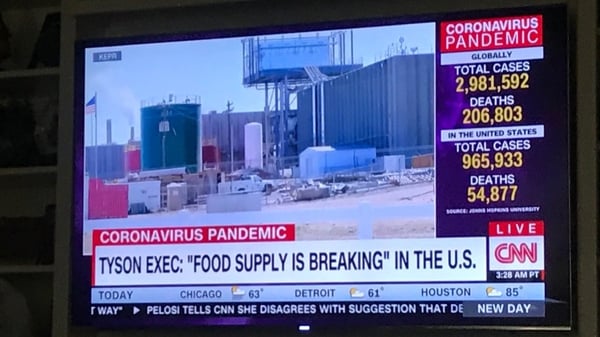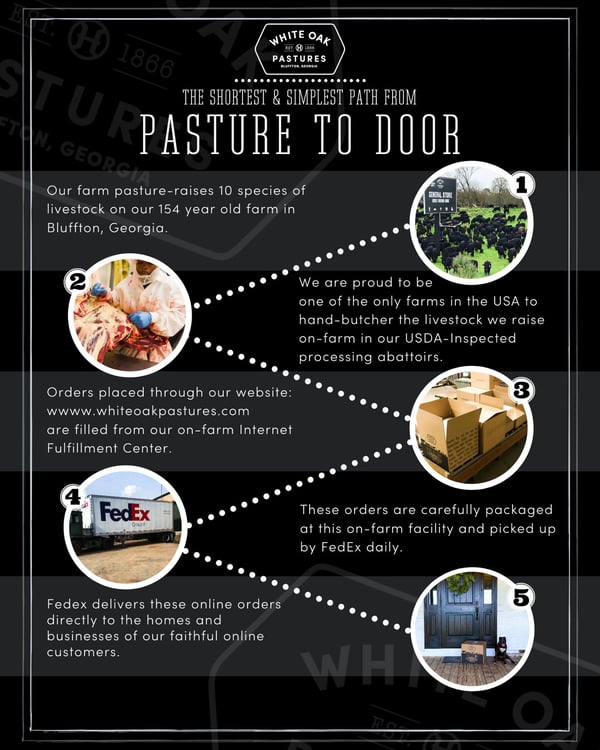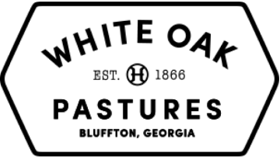For the last 25 years, some of us have recognized there is no resilience in the American food production system. Today, it is painfully evident to anyone who takes a look at it.
Even the executives of the largest meat company in the world are publicly admitting it. This was the headline on CNN the morning of April 27, 2020: Tyson Exec: “Food Supply Is Breaking” In The U.S.

White Oak Pastures [and a few other vertically-integrated, privately-owned, multi-species farms] has spent the last 25 years building a resilient food production system that can feed our supporters through these adverse times.
The multinational food companies have spent the last 25 years narrowly focused on maximizing their profits through efficiency. Now, amidst the challenges of this pandemic and pending food shortages, these factory farms are euthanizing pigs and poultry because the processing plants have closed and cannot get to them. With pork in particular, it's being reported that hog producers may euthanize as many as seven million pigs in the upcoming months.
Concentrated Animal Feedlot Operations [CAFO] turn these animals into obese creatures that would never exist in nature. If they cannot be slaughtered on schedule, they will soon die from the diseases of the same sedentary lifestyle that kills most people. Here is an email from a Meat and Poultry Inspection Bureau Chief that we received [April 27, 2020]:
State Directors-
I am sure you are all aware of the closures of large packers due to COVID-19 outbreaks, and the ripple effects this is having throughout the industry. The loss of processing capacity is causing a backlog of animals, for pork producers in particular. Here in Iowa and in other Midwest states, producers are looking at having to euthanize market-weight animals due to lack of processing. Our small plants here are booked out for months, and farmers are selling off hogs at next-to-nothing to anyone willing to drive up and buy one. Iowa pork producers and Iowa Dept. of Ag are doing everything we can to find outlets, including processing for food banks, but it’s just nowhere near enough.
Yesterday, the other Midwest directors and I received a great reach-out from Louisiana looking to buy hogs. So my question for all of you in other areas of the country: who else has room to buy and process hogs?? Every one of these hogs that we can find shackle space for is one less that has to be wasted, and can instead go to keeping our communities fed. If your state plants have the ability to take on some of these hogs, they will be able to purchase them for next-to-nothing, and I believe that Pork Producers will even help to arrange transportation.
Our pasture-raised animals' health is not so time-sensitive:
- Our animals, like the rest of our farm, are resilient.
- If we don't slaughter our animals when we planned to, they are healthy enough to live out a natural life expectancy.
- Our animals are athletes. They are not dying of obesity and the diseases of sedentary life.
In addition, I am not aware of any small, privately-owned plants that have had to cease operations during this pandemic. [It could happen, but to my knowledge, it hasn't so far.] These independent plants also have resilience.
This pandemic has highlighted yet another reason why the consolidation of these multinational companies leaves them so fragile. There are fewer meatpacking plants than ever - just 50 plants process 98% of America’s meat supply. So when a dozen of them close, their entire system starts to break down.

The centralized, industrialized, commoditized production system brought us obscenely cheap, wastefully abundant, and boringly consistent food. This pendulum has swung too far. The unintended consequences of this cheap food fell on the backs of the welfare of the animals; the degradation of our land, water, and air; the impoverishment of rural America; and the degradation of our climate.
There is a lot wrong with the way that our country is feeding itself. Consumers need to support the system that they want with their food dollars.
When speaking about multinational food companies for a recent Forbes article, Will Harris explained that "consolidation made production very cheap and very efficient, but it took away the resilience.”
Temple Grandin, the animal behavior expert, has worked in the livestock industry for years, with everyone from large-scale meatpacking plants to our own farm when we were designing our abattoirs. Grandin has added her voice to the chorus as well: big meat supply chains are fragile because of consolidation.
Executives at multinational food companies are saying that our food chain is broken, and we see where there are cracks in the big meat supply chain:
- CAFO livestock, fattened on grains and pumped with antibiotics, are likely to die of obesity and other sedentary diseases if they aren't slaughtered on schedule. Even the USDA is stepping in to help "advise and assist on depopulation and disposal methods” of livestock.
- Stories about the hazards for meatpacking plant workers with major meat companies have been dominating the news, with many of the communities surrounding large meatpacking plants becoming the country's biggest COVID-19 hot spots.
However, at White Oak Pastures, our farm remains resilient:
- Our pasture-raised animals are healthy enough that we can simply let them stay on pasture in the case of a delay in scheduled slaughter.
- Our two on-farm abattoirs are run at a humane rate of slaughter, valuing the life of both our livestock and our workers. Because of our size and business model, we are able to modify operations as needed to ensure the health and safety of our workers and community.
“There could be and should be two or three White Oak Pastures in every agricultural county in this nation,” says Will in Forbes. “Tyson is highly scalable but not highly replicable. [Local production] is highly replicable. It’s not highly scalable.”
At a time when we're all asking how the food supply chain can be more resilient in the future, we believe the conversation should include what kinds of radical, alternative systems are working already—and what kind of new supply chain we can build moving forward.




